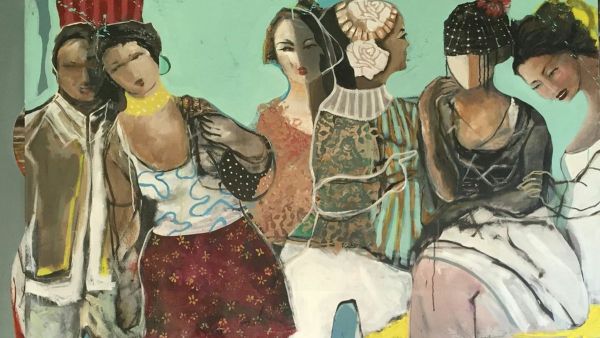As the Latin name suggests “Revertetur,” the exhibition now up at Carre d’artistes, marks a return home for the works of famed artist Mona Nahleh.
The work on display has previously been exhibited outside Beirut - at three separate exhibitions in Doha, Dubai and Amman. Nahleh’s Beirut-based fans became interested in the work when she posted glimpses of the series on social media, which prompted the decision to exhibit these works back in Lebanon as “a kind of retrospective,” said Nahleh, who started her artistic career in 1994.
Nahleh prefers not to put her work within any particular school, but chooses expressionism if pressed. Her paintings are colorful representations of human energy, often taking the female form and ranging from completely abstract to the more figurative.
“In any given painting, if you cover the face and the hands,” she said, “you would still have an abstract painting. It will not dissolve.”
Not only are Nahleh’s figurative paintings quite abstract, her abstract works are, but in her opinion, just as much about humans as the more realistic ones. In her opinion, “Everything the artist does is really about humans. Even if it is an idea of something, this idea is connected to humanity or to the experience of human beings.”
The women featured in the series are mysterious in their abstraction, yet deeply familiar in the way that only something that leaves enough available space for your own projections can be. There is something soft, slow-moving and sad in them.
{"preview_thumbnail":"https://cdn.flowplayer.com/6684a05f-6468-4ecd-87d5-a748773282a3/i/v-i-0…","video_id":"06e8fae2-3f91-4a6d-96d1-342e5bb5261e","player_id":"8ca46225-42a2-4245-9c20-7850ae937431","provider":"flowplayer","video":"Suspected Bomb Blast Leaves 13 Injured in France"}
Many of the women bow their heads slightly, and gaze through tired eyes that seem about to close or fighting to stay open. Though Nahleh claims not to think too much herself while working, her figures often appear deeply lost in thought.
Of her subject matter, Nahleh said, “I can see myself more through my figures, if it’s a woman. It’s being more honest to my feelings.”
A common recurrence on Nahleh’s canvases is the overlaying of bodies - sometimes multiple women, sometimes a woman accompanied by an infant, sometimes a family.
“I don’t think anybody really quite exists on their own,” the artist said. “We are all entangled in our experience here on earth, in one way or another. So even people we meet by accident for a fleeting moment, they leave some of their energy with us.”
Nahleh makes a point of not trying to say much through her paintings. “I don’t want to preach anything. I don’t assume I know more than others,” she confided. “I’m expressing what I have in my heart, in my mind.
“Sometimes an aspect of humanity will strike me at a certain point,” she added, referencing her last exhibition in Lebanon, “Age of Schism,” confessing that sometimes she does reflect on a “lack of humanity” she sees in the world.
Nahleh feels there’s been a good response to her show, and credits Carre d’artistes for much of this. “It is a very pleasant place, and accessible to people, and they have a wonderful dynamic going on,” she said. “Here, it’s very young. It’s very fresh. It’s very appealing.”
Carre d’artistes opened in 2017. Gallery director Maissa Fatte believes her space is unlike any other in Lebanon. The gallery currently shows 20-25 international artists, including six or seven Lebanese artists.
Founded in 2001 with the goal of democratizing art, the France-based Carre d’artistes has more than 30 contemporary art galleries around the world, focusing on emerging artists. To ensure that art is accessible to a wide audience, each artwork is priced according to its size, and the entry point for a small format artwork is $165, regardless of the artist or the technique used.
The gallery recently developed a “premium bucket” to supplement the original system, which offers individually priced pieces, in order to accommodate certain artists who started out with Carre d’artistes but have grown markedly and could no longer continue on at the same price points.
Fatte sees Carre d’artistes’ international presence as a door-opener for its Lebanese artists, with some being picked up by their other locations around the world.
“Revertetur” is up at Carre d’artistes through June 30.
This article has been adapted from its original source.








